Oxford Martin Programme on
Climate Pollutants
The Oxford Martin Programme on Climate Pollutants was established in 2017 and ended in 2021. This page is an archived resource. Programme Director, Professor Myles Allen, is involved with several other Oxford Martin School programmes and the GWP* metric continues to grow in influence.
The Challenge
For policy makers to make informed decisions to mitigate against climate change, the effects of different climate pollutants on warming must be compared against each other.
Carbon dioxide is the main driver of anthropogenic climate change. Other climate pollutants, including methane and nitrous oxide, contribute half as much warming again, and will become more important as carbon dioxide emissions are reduced. However, many of these other pollutants are short-lived, unlike carbon dioxide. Methane has a half-life of around a decade, so although the immediate effect of a molecule of methane on temperature is stronger, in 50 years the impact will be much smaller.
How do we compare the different forcing agents when they cause different amounts of warming over different time periods? Currently, governing bodies use approved metrics, for example, “global warming potential”. This programme will investigate how to improve these metrics and their use for informing policy. Some are used for purposes for which they were not originally designed, and can in some cases provide misleading results.
The key questions this programme will answer are:
- Are the climate metrics used in international agreements fit-for-purpose?
- Are there better climate metrics than those being used?
The programme will compare whether different metrics are useful in relating anthropogenic emissions to impacts on climate. The work will look at metrics that are currently used in international agreements and schemes, as well as new metrics that are being proposed.
Under ambitious mitigation scenarios, the effects of short-lived climate pollutants become more important, as carbon dioxide emissions are reduced. The programme will investigate the role of different climate pollutants under different scenarios for reducing carbon emissions towards net zero.
This programme will demonstrate new ways of evaluating the climate response to different mitigation scenarios. This will enable policy makers to make informed decisions about the best course of action to achieve their climate goals especially under ambitious targets following from the Paris Agreement.
featured publication
Ensuring that offsets and other internationally transferred mitigation outcomes contribute effectively to limiting global warming
This paper published as an accepted manuscript in Environmental Research Letters, shows that a simple “do no harm” principle regarding the choice of metrics to use in internationally transferred mitigation outcomes can be used to guard against an offset agreement that involves exchanging greenhouse gases with different lifetimes increasing global warming on some timescales. This may also be applicable in other contexts such as voluntary and compliance carbon markets.
The paper also shows that both approximate and exact “warming equivalent” exchanges are possible, but present challenges of implementation in any conventional market.
Python notebook for calculation of warming-equivalent emissions, Supplementary code and datafile to reproduce figures in the article "Ensuring that offsets and other internationally transferred mitigation outcomes contribute effectively to limiting global warming"
Python notebook Supplementary datalatest news
View allGet the maths right on emissions or risk missing temperature target, warn Oxford scientists
The way that governments are setting targets for different greenhouse gas emissions could be “unfair, inefficient and dangerous”, researchers argue in a new paper.
'To meet Paris Agreement targets, focus on warming, not emissions'
New Zealand’s farmers have a chance to be climate leaders
New Zealand’s new 2050 climate targets are good news, as the country’s contribution to global warming could be halted before 2050 if the stated cuts start immediately.
Why protesters should be wary of ‘12 years to climate breakdown’ rhetoric
videos
Prof Myles Allen, Kaya Axelsson, Prof Sam Fankhauser & Dr Steve Smith in conversation: "Net zero – why and how?"
A solution to the misrepresentations of CO2 equivalent emissions of short lived climate pollutants
Measuring progress towards the Paris Agreement: aligning policy and science in global stocktakes
"Climate change: what science and the IPCC report has to say" with Prof Myles Allen & Prof Nick Eyre
publications
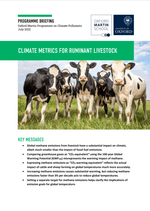
Climate metrics for ruminant livestock

Ensuring that offsets and other internationally transferred mitigation outcomes contribute effectively to limiting global warming
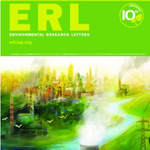
Demonstrating GWP*: a means of reporting warming-equivalent emissions that captures the contrasting impacts of short- and long-lived climate pollutants
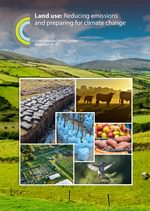
Land use: Policies for a Net Zero UK
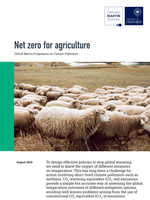
Net zero for agriculture

Improved calculation of warming-equivalent emissions for short-lived climate pollutants
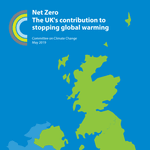
Net Zero The UK's contribution to stopping global warming

Achieving Net Zero: Metrics and Policies Aligning Energy, Industry and Agriculture with 1.5 Degrees

A solution to the misrepresentations of CO2-equivalent emissions of short-lived climate pollutants under ambitious mitigation
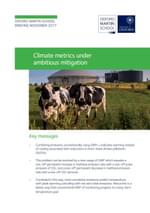
Climate metrics under ambitious mitigation
Keep in touch
If you found this page useful, sign up to our monthly digest of the latest news and events
Subscribe